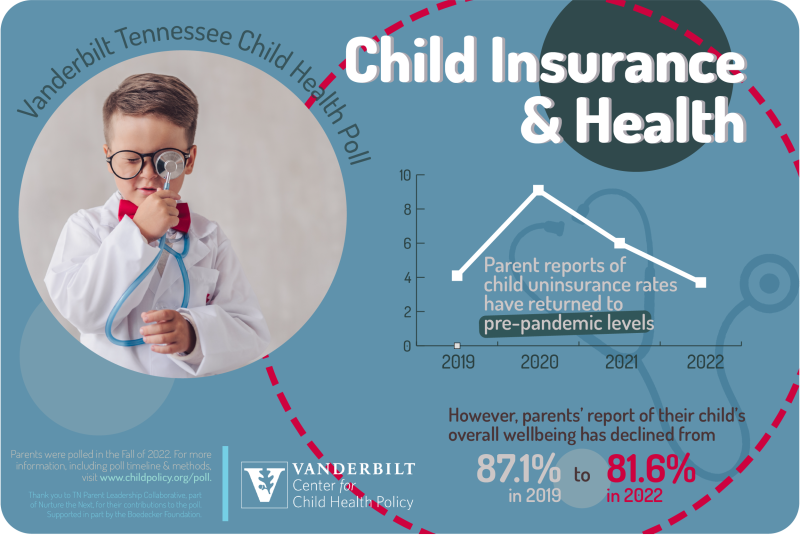At the start of the COVID-19 pandemic the rate of Tennessee uninsured children more than doubled as the state experienced the highest spike in unemployment since the Great Depression. The latest analysis of the annual Vanderbilt Child Health Poll of Tennessee parents shows the rate of uninsured children in the state has returned to prepandemic levels at 3.7%, yet concerns remain for the future of child health insurance coverage.
This year’s poll surveyed more than 1,000 Tennessee parents to assess the trends in overall well-being of children and insurance status, plus several other issues impacting Tennessee children. More than half of parents (51%) reported their children were covered by private or employer-based insurance, and about 46% said their children were covered by TennCare or CoverKids, the state’s Medicaid and Children’s Health Insurance Program health insurance options.
In 2020, when many parents lost jobs and associated insurance coverage due to the pandemic, there was a sharp decline in the number of parents who reported they had private or employer-based insurance and a doubling of parents who reported their children lacked health insurance to more than 9%. The number of children who were covered by TennCare and CoverKids helped offset some of the insurance loss.

“Tennessee has traditionally had one of the lowest rates of uninsured children in the U.S., and seeing the uninsured rate drop below 4% is good news,” said Stephen Patrick, MD, MPH, MS, director of the Vanderbilt Center for Child Health Policy and a neonatologist at Monroe Carell Jr. Children’s Hospital at Vanderbilt. “This year the public health emergency will end, which means states will lose the additional funds provided to keep people covered. That will result in states beginning to reevaluate who meets eligibility criteria for Medicaid.”
For the first time since the beginning of the pandemic, the state will begin to reevaluate the eligibility of people covered by Tenncare and CoverKids this spring. This process will help identify children who are no longer eligible, but it also means thousands of children across the state could lose insurance coverage.
Researchers also found that roughly 81% of parents across all regions and racial and ethnic groups reported their child’s overall well-being as “very good” or “excellent” in 2022, down slightly from 84% in 2021 and 83% in 2020. There were similar small declines from 2021 to 2022 in parents who said their child’s health was “very good” or “excellent” in all regions and among racial and ethnic groups.
“While these changes might seem small, these declines in child well-being represent thousands more children in Tennessee who aren’t in their best possible health,” noted Joe Zickafoose, MD, MS, an assistant professor of Clinical Pediatrics at Monroe Carell and a member of the Center for Child Health Policy. “This is part of a broader decline in child well-being that began even before the pandemic and should worry us all.”
The Vanderbilt Child Health Poll is conducted annually to gauge parents’ concerns about a wide range of topics. The data, collected from a representative sample of Tennessee parents across each of the three grand divisions of the state, focus on child health issues ranging from education and schooling to food security, insurance status, and mental health. The research was funded in part by a grant from the Boedecker Foundation.